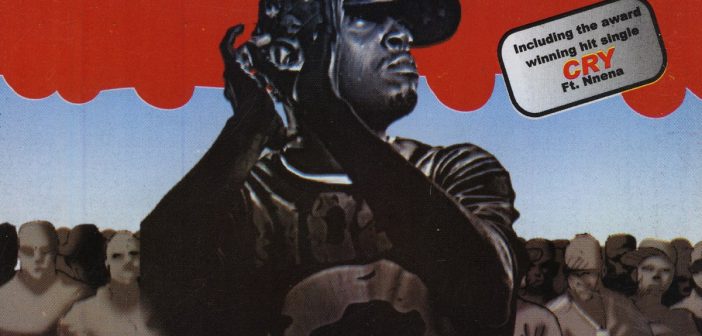Get out your dictionaries and thesauruses. We are about to dive into a Mode Nine album.
E Pluribus Unum announces itself with all of the gusto of a Roman Emperor. ModeNine’s third studio release, which is the Latin translation of ‘amongst many, one’, already marked itself as a classic from the name. Mode Nine says this in the first track amidst shoutouts to the people who helped him make this album. There are shoutouts to the greats—Fela, and Art Alade. Around the time this album was made, the entertainment industry was mourning the loss of the ‘cool as a cucumber’ J.T. Tom West, who also got a shout-out from this album.
Here is what I learned from the first track of this album; When someone names an album in Latin, everyone is in trouble.
To put this album in perspective, we have to understand who Mode Nine was and the environment he was in.
Born in London in 1975 and internalizing that culture, and then moving to Nigeria at pre-teen, there was no way in hell that Babatunde Adewale was going to fit in with Nigerian kids. Not when he had seen what hip-hop was like. For the brief period where Nigeria romanticized foreign influence in their entertainment, he was king, but his reign was effectively cut off as he had come in at the end of the era. By the 2010s, Nigerians would only have ears for Afrobeat and Afro-hip hop.
I will never forget the packaging of E Pluribus Unum. It came in a red and black paper jacket. The industry had ditched plastic for this cheaper option, and his picture was embossed on the jacket. Amongst all the albums we bought, I remember the feel of E Pluribus Unum in my hand. it was red and black. The font was stylized, and Modenine’s silhouette was embossed on the glossy back. I knew it was going to be different.
Let the tracks roll out now…
Intro
Mode Nine starts spitting fire right ou the bat, All y’all displaying reptillian traits’
Then he said that he was dropping quality like he was recording from DVD to VHS. (Do you get it? Video quality drops when you switch from watching DVD to VHS. Surely you knew that?). We immediately knew that we were not running out of strong punchlines any time soon. Already known as the Punchline man, Modenine displayed a lyrical wit that remains unmatched by anyone before or after him in the industry. If you were a teenager in 2007, you definitely had a notebook with Modenine’s lines. Here are a few from the intro track alone;
I got lines sicker than St. Nicholas
You are fighting for a lost cause,
I suggest you men-o-pause
I got punchlines…like a convent, you got nones.
Neat!
Cry
We immediately get serious when it comes to Cry. You may be a good lyricist, but it takes a lot of precision to fold your rhymes, words and puns into a decent story. And boy, does The Mode pull it off. Modenine says a lot of words. It is immediately deep, soulful prose about the various shades of grief. The chorus is soft, sung in Igbo by Nnena (where is she anyway?), and we treat the grief of a woman who lost a love she has had since childhood and then the grief of two mothers who lost sons that have been best friends since primary school. To Mode Nine, Loss is amplified by time and losing someone you have known your whole life is the greatest grief ever.
Toron Giwa
On Toron Giwa is where I heard the word ‘hypochondriac’ first. I checked my dictionary for the meaning. Could Mode Nine have been my English Teacher?
Paralysis becomes you,
If you try to come through,
I’m confident to unpin you after the one, two
(A WWE reference. Could also be something from football. Who knows? It is Mode Nine).
It was on this track that Mode Nine went after the Nigerian rappers at his time, picking Ruggedman as a target. He talked about how unmotivating their rap was and how the game they were spitting was not hard enough.
“But I can rap about issues,
Speak caustic words, burning through tissues,
It is official,
Your whole wordplay is poop,
While Mode Nine spent his latter years in Nigeria, one thing he never forgot was the roots of hip-hop he brought back with him from London. To this day, the hardcore rap that lined the East Coast is still in him.
Nigerian Girls
If there is any song that revealed the genius of the Mode to even the most pedestrian of listeners, it was this. This song was for the whole of Nigeria. I will admit that it is slightly tinted with misogyny and depends on stereotypes (both harmful and benign).
Nigerian Girls was intelligently crafted under those conditions nonetheless to be the way it was. This is a song that you cannot add or take anything from (well, except the impassioned singer on the refrain).
Nigerian Girls made me appreciate the diversity of Nigerian people (well, women) and remains his most commercially popular song to date.
Leaders of 2morrow
ModeNine had a lot to get off his chest about the country, and Leaders of 2morrow was only the beginning.
Leaders of 2morrow criticized the proliferation of child labour, and child hawkers in the country. At this time, there were so many out-of-school kids piling on the streets, selling snacks and trinkets as education further worsened. While it was only the beginning, Nigeria had never seen this number of out-of-school children. Ras Mike spoke some French that I did not understand. The song also tackled how and why, and what children should be trained in and exposed to so that they can lead tomorrow favourably.
Fellow Nigerians
Fellow Nigerians had ModeNine speak even more boldly about Nigeria’s decline. Same problems as we have already been talking about. Do I want to get into this? I think not. Just look around you. There was nothing Mode Nine said that we aren’t repeating now.
Regular Guy
Regular Guy is basically a day in Mode Nine’s life. This was before the huge celebrity craze in Nigeria. Before money left deep pockets and papered the walls of our entertainment scene. At this time, you could see how a regular guy could afford a flight ticket with no problem.
Hands Down
Did not like Hands Down that much. This was Mode Nine trying to get into the Nigerian club scene, which was becoming wildly different from the American club scene. We were fine dancing to P Square without any heavy beats.
Pigeon English
What is a hip-hop album without a skit? A skit usually describes a situation, using humour to expose the underbelly of it. Mode Nine’s Pigeon English takes a dig at Nigerian rappers depending solely on Pidgin English to rap, which he found ludicrous. Doesn’t come as a surprise. Mode Nine’s schtick has always been to tell rappers to use their words.
Contradiction
Contradiction, one of the most solid tracks on this album, perhaps my favourite because I started dreaming of it two years before I ever put a pen to this review, is where Mode Nine waxes philosophical. He had thought about this for a while. There is a sample here that sets the tone for the track, a hook put there for hook’s sake and verses that are as ‘nice as hell’. ModeNine discusses contradictions in reality, turning on a little self-awareness, “the rapper with the most skills, sells the least”.
Ogun I Soye
Ogun I Soye could easily be the best story on the album. I was about 13 when I heard this song for the first time, still in secondary school. I loved what he used the church piano for on this track. In this beautifully crafted story, rhyming and punching, ModeNine tells the story of Dele and how Dele’s father helped him get into university. Thanks to “Emmanuel Okoli” for the inspiration. At this point, we’re halfway through the album.
It’s A Goal
In It’s A Goal, ModeNine raps a puff piece using football as a backdrop. It was targeted to be a street favourite, to vibe with his fans, that were his peers. Football was a line that connected all of us back then. The Premier League was growing in popularity, renewing our attention to Football. Now, it serves as a throwback to that time as Modenine plays with the names of players and makes punchlines off them.
Lagos State of Mind
Till this day, Lagos State of Mind spits the truth about Nigeria’s most commercial and chaotic city. “Protect your phone and your wallet when you hit Lagos.” I should have played this song in my first month in Lagos. Maybe, I would have learned a thing or two.
The Album hits a lull
Africa was about African Pride. That is as much as I know about it. It also won’t be the last song he will make with 2Face.
Everything grinds to a slow as we cycle through Fake Up in The Club, Not Like U and Spectacular.
The Outro was Modenine puffing his chest as usual.
And just when we thought it had ended, he turns up with the most intimate track of his career. Featuring Cobhams, on a track that could fit with a car ride scene from a movie. Journey So Far is also up there.
Politics and Lies was another jab at the state of Nigeria. A much clearer view of Nigeria’s foreign and internal policies and how these arrangements are dumping the citizens in the pit of suffering. On this note, the album ends.
ModeNine is a perfect example of a rapper that knows how to write. He was an essayist. Just take a look at Lagos State of Mind, a cross-sectional study of the city that remains to this day. Modenine had me googling his lyrics because, without a lyric book, there is no way in hell you are going to understand half the things ModeNine says. His style of rap was a little too hard in a budding hip-hop scene where Nigerians were experimenting and fusing their local tongues into hip-hop. Modenine was never going to grow out of a cult following. Head-breaking lyrics were not going to be our vibe anyway.
Plus, Modenine went to war against what was Nigerian rap then, and it positioned him as an anathema to what was Nigerian. If he had met up with Jude Abaga somewhere, then maybe it would have been different.
I thought Modenine was the Batman of Nigeria’s hip-hop scene, but not really. He is as cheeky as they come. He was unafraid to shoot at other rappers, and his wordplay was good, the best to this day. Sadly, he would never get the commercial appeal he should have gotten, even as he was arguably one of the best storytellers. Songs like Cry and Ogun I Soye are masterpieces in the art of lyrical storytelling.
E Pluribus Unum tackled many themes; the state of hip hop in Nigeria, which The Mode was not satisfied with, political ingenuity among our politicians, the single guy experience in Nigeria and male camaraderie, and grief. This album was so intelligent that you had to be with the culture to appreciate it properly. Years after, E Pluribus Unum dares to get better as age allows one to uncover subliminal messages. Modenine treated the rap game as a highly valued exclusive club.
All through his career, Modenine stayed true to what he believed, even if it cost him the world. He may not have sold millions of albums, but he is up there with the greats, digging into an intellectualism that is fast disappearing amongst rappers and deeper into his hip-hop influences. For the sake of art, Modenine gave up everything else.
Perhaps ModeNine’s greatest power was the fact he could see the truth and speak. till today all the tracks from E Pluribus Unum remain relevant to the Nigerian experience (mostly male and middle-aged). Say what you want, but every Regular Guy today can relate to Modenine’s Regular guy. He is still hailed as one of the best two rappers from Nigeria, and he’s not number two.
The Polymath cannot be bested.
So, of course, this album is a classic. Let us induct it into the Hall of Fame already. Have you listened to it? What was your favourite track?





1 Comment
Nice review,it’s actually Emmanuel Ugolee(Google him). Journey so far gives me goosebumps every time I listen,Cobhams is a beast.